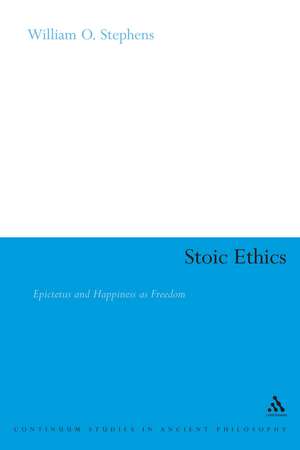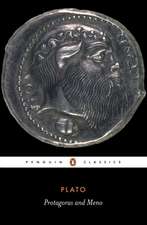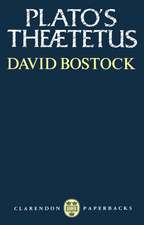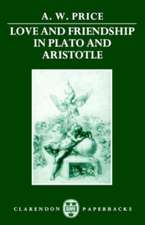Stoic Ethics: Epictetus and Happiness as Freedom: Continuum Studies in Ancient Philosophy
Autor William O. Stephensen Limba Engleză Paperback – 29 noi 2017
| Toate formatele și edițiile | Preț | Express |
|---|---|---|
| Paperback (1) | 236.19 lei 6-8 săpt. | |
| Bloomsbury Publishing – 29 noi 2017 | 236.19 lei 6-8 săpt. | |
| Hardback (1) | 889.71 lei 6-8 săpt. | |
| Bloomsbury Publishing – 9 mai 2007 | 889.71 lei 6-8 săpt. |
Din seria Continuum Studies in Ancient Philosophy
- 22%
 Preț: 256.59 lei
Preț: 256.59 lei - 22%
 Preț: 1005.41 lei
Preț: 1005.41 lei - 22%
 Preț: 883.86 lei
Preț: 883.86 lei - 22%
 Preț: 897.55 lei
Preț: 897.55 lei - 22%
 Preț: 888.81 lei
Preț: 888.81 lei - 31%
 Preț: 949.08 lei
Preț: 949.08 lei - 31%
 Preț: 891.18 lei
Preț: 891.18 lei - 22%
 Preț: 947.11 lei
Preț: 947.11 lei - 23%
 Preț: 255.19 lei
Preț: 255.19 lei -
 Preț: 255.66 lei
Preț: 255.66 lei - 22%
 Preț: 889.88 lei
Preț: 889.88 lei -
 Preț: 255.11 lei
Preț: 255.11 lei -
 Preț: 256.38 lei
Preț: 256.38 lei -
 Preț: 256.02 lei
Preț: 256.02 lei -
 Preț: 256.85 lei
Preț: 256.85 lei -
 Preț: 255.66 lei
Preț: 255.66 lei -
 Preț: 255.66 lei
Preț: 255.66 lei - 14%
 Preț: 889.97 lei
Preț: 889.97 lei -
 Preț: 257.12 lei
Preț: 257.12 lei - 14%
 Preț: 946.72 lei
Preț: 946.72 lei
Preț: 236.19 lei
Preț vechi: 304.93 lei
-23% Nou
Puncte Express: 354
Preț estimativ în valută:
45.20€ • 49.08$ • 37.97£
45.20€ • 49.08$ • 37.97£
Carte tipărită la comandă
Livrare economică 23 aprilie-07 mai
Preluare comenzi: 021 569.72.76
Specificații
ISBN-13: 9781350068353
ISBN-10: 1350068357
Pagini: 208
Dimensiuni: 156 x 234 mm
Greutate: 0.29 kg
Ediția:NIPPOD
Editura: Bloomsbury Publishing
Colecția Bloomsbury Academic
Seriile Continuum Studies in Ancient Philosophy, Bloomsbury Studies in Ancient Philosophy
Locul publicării:London, United Kingdom
ISBN-10: 1350068357
Pagini: 208
Dimensiuni: 156 x 234 mm
Greutate: 0.29 kg
Ediția:NIPPOD
Editura: Bloomsbury Publishing
Colecția Bloomsbury Academic
Seriile Continuum Studies in Ancient Philosophy, Bloomsbury Studies in Ancient Philosophy
Locul publicării:London, United Kingdom
Caracteristici
Stoicism, the dominant Hellenistic philosophical school, has had a major impact on the history of Western philosophy.
Cuprins
PrefaceIntroduction1. What Exactly Is Up to Me?2. How Must I View the Use of Externals?3. How Does the Stoic Love?4. Happiness as FreedomBibliography
Recenzii
"This monograph contains several insightful and subtle comments on Epictetan and Stoic ethics, and is of interest to anyone looking for a philosophical treatment of certain problems to which they give rise ... One attractive feature of the book is the author's engagement with general philosophical issues and the frequent comparison he makes between Epictetus and modern thinkers, for example, Erich Fromm (108-9 and 119 n. 9). Stephens' personal opinion on the strengths and weaknesses of Stoic and Epictetan ethics is carefully presented at the end (150-154). From this perspective, and considering also the great clarity with which it is written and the numerous quotations from Epictetus, Stoic Ethics: Epictetus and Happiness as Freedom may be used as a good general introduction to this major Stoic philosopher." - Notre Dame Philosophical Reviews
"The book is a fresh and valuable overview of Stoic ethical themes as presented in Epictetus's writings. Its own writing is graceful, the examples are fascinating, and careful and thorough attention to the texts of Epictetus brings to light many bits of Epictetus which will be unfamiliar to those who have read only the Encheiridion...It makes an important contribution to our understanding of Roman Stoics' mighty struggle to find happiness in a turbulent and uncontrollable world which is, in those respects, much like our own." -Eve A. Browning, Bryn Mawr Classical Review, 2010
"The book is a fresh and valuable overview of Stoic ethical themes as presented in Epictetus's writings. Its own writing is graceful, the examples are fascinating, and careful and thorough attention to the texts of Epictetus brings to light many bits of Epictetus which will be unfamiliar to those who have read only the Encheiridion...It makes an important contribution to our understanding of Roman Stoics' mighty struggle to find happiness in a turbulent and uncontrollable world which is, in those respects, much like our own." -Eve A. Browning, Bryn Mawr Classical Review, 2010

















